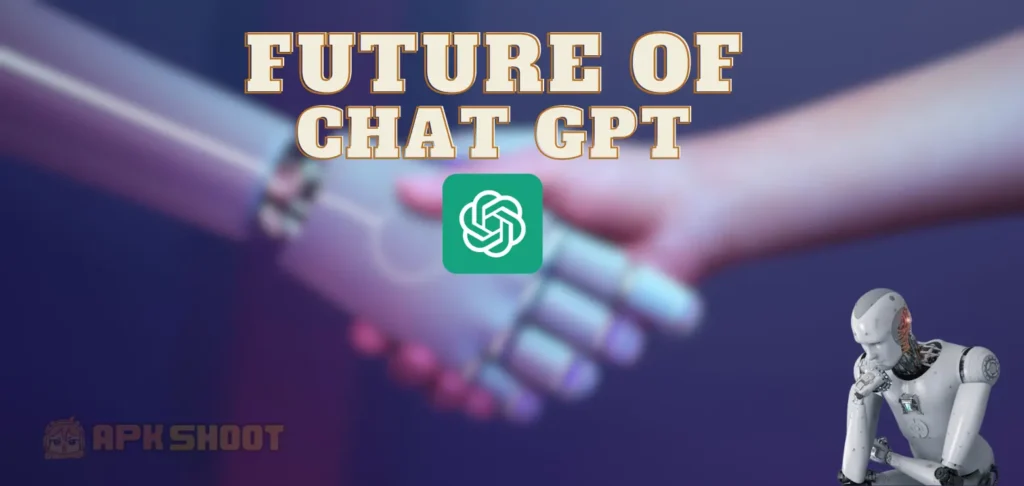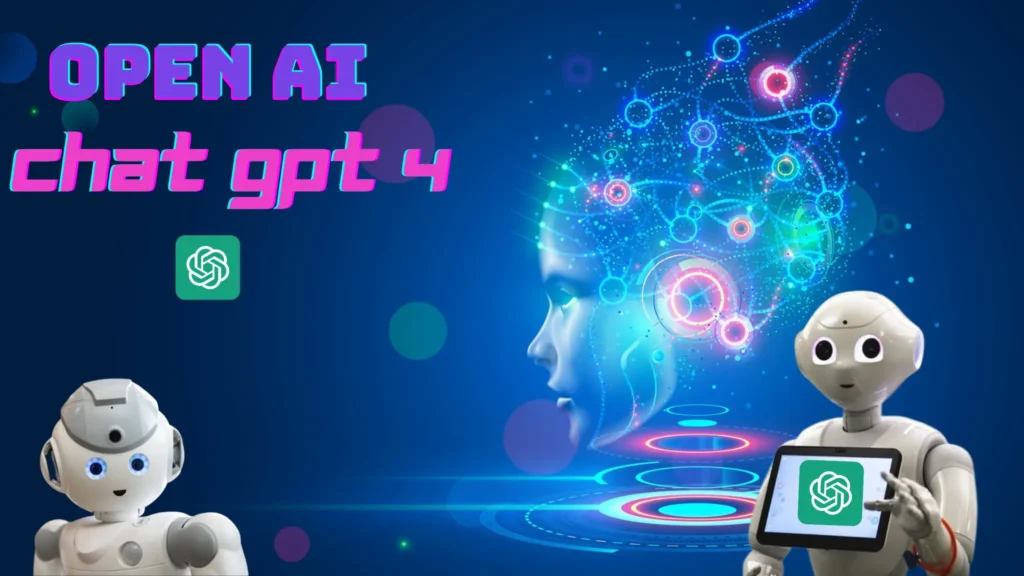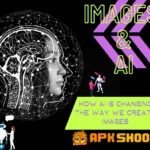Chat GPT (Generative Pretrained Transformer) is a language model generated by AI. It understands and responds to human language using machine learning and natural language processing. The future of Chat GPT is so bright. GPT Chat is a type of conversational artificial intelligence that learns from data and improves over time. In this article, APKShoot explores the developments in ChatGPT technology, its applications, possible challenges in the future, and the impact of GPT Chat on society and business.
ChatGPT is a language model intended to interpret natural language and respond to user inputs in a human-like manner. It has been trained on massive volumes of text data, allowing it to recognise the complexity of language and context. Chat GPT is currently making substantial advances in a number of industries, including customer service, education, and healthcare. However, the potential of this technology is significantly greater than what we have seen currently.
Advancements in Chat GPT Technology
Chat GPT technology has advanced significantly in recent years. ChatGPT has improved its capacity to understand and create human-like answers. Here are some of the advancements of GPT Chat
1. Machine Learning and Natural Language Processing
Chat GPT can learn from data and improve its efficiency over time through machine learning, a type of artificial intelligence. Natural language processing (NLP) is a part of machine learning that makes it possible for ChatGPT to understand human language. These improvements in machine learning and natural language processing (NLP) have made GPT Chat more knowledgeable and efficient.
2. Conversational User Interface
A conversational user interface (CUI) is a type of user interface that allows people to engage with computers using natural language. Chat GPT utilises CUI to give a more human-like contact with users. This helped improve the user experience and made open AI chat easier to access.
3. Ability to understand the context
Chat GPT is capable of learning the historical context of a discussion. This means that it can understand the meaning beneath a statement and react accordingly. This enhanced open AI Chat efficiency and awareness.
4. The Evolution of ChatGPT
As artificial intelligence keeps growing, we can expect ChatGPT to progress and improve. We are already witnessing developments in natural language processing. These advancements make ChatGPT much more capable of recognising and generating human-like answers. Furthermore, as the technology becomes more widely available, we are likely more inventive in ChatGPT applications.

ChatGPT and the Future of Communication
In the future, we will see a huge shift in how people connect with one another. ChatGPT is able to serve an important role in this revolution. With its capacity to understand, ChatGPT improves communication between different languages and countries. It can also help to break down boundaries between people with different communicating styles and capabilities.
1. Chatbots and Customer Service
One of the most important uses of Open AI ChatGPT is customer service. ChatGPT-powered chatbot technology enables continuous service to customers. They answer enquiries and resolve difficulties efficiently and quickly. As technology advances, we should expect increasingly personalised experiences with chatbots that make the consumer experience even more smooth.
2. Education and Language Learning
The GPT chatbot is also expected to have a big influence on education. AI language models, such as ChatGPT, have the potential to revolutionise learning a language. ChatGPT’s capacity to create authentic language allows it to give students personalised language practice. This practice is suited to the student’s specific requirements and learning styles. Language learning might become easier and more successful for individuals all around the world as a result of this technology.
3. Healthcare and Mental Health
The GPT chatbot has the potential to completely change the healthcare business, especially in the discipline of mental health. GPT Chat, with its capacity to create human-like answers. This might provide a secure and non-judgemental environment for people to discuss their mental health issues. It might also help medical professionals to investigate and diagnose mental health issues that result in improved outcomes for patients.
4. Privacy Concerns and Ethics
As with any technology, there are concerns about privacy and ethics when it comes to the GPT chatbot. For example, some worry that the technology could be used to create fake news or misleading information. Additionally, there are concerns about data privacy and the potential misuse of personal data. It is essential that we address these concerns and develop ethical guidelines to ensure that GPT Chat is used for the betterment of society.
OpenAI and ChatGPT
For years, the OpenAI organisation that created ChatGPT has been at the top of AI research. As technology keeps developing, we are expecting OpenAI to stay a leader in the field. OpenAI’s dedication to accessibility and ethical AI is also necessary for ensuring that the technology is created and employed carefully.
GPT-4, the next version of the ChatGPT technology, is currently under development by OpenAI. GPT-4 will be more technologically advanced and effective than previous versions.
GPT-4 and Beyond
GPT-4, the next version of the Chat GPT technology, is currently under development by OpenAI. GPT-4 will be more technologically advanced and effective than previous versions.
We should expect to see the latest uses of ChatGPT and other AI language models as we keep pushing the limits of AI technology.
One of the most important areas of focus for GPT-4 will likely be in the field of natural language processing. Researchers are aiming to increase the model’s ability to interpret and construct complex words. As well as increasing understanding of different languages and contextual details. Such improvements may enable ChatGPT to fully understand and react to human language even better. That results in GPT being more personalised and having a successful interaction with users.
Another area of attention for GPT-4 is the establishment of more specialised language models. While ChatGPT is capable of giving answers on a variety of topics, there is still space for progress in its ability to deliver expert-level answers. For example, specialised language models might be created for industries such as medicine or law, providing more precise and comprehensive answers to individuals.
GPT-4 is projected to be more efficient and flexible than previous versions. The advanced feature of ChatGPT in a variety of sectors is the main reason for its popularity among people. We should expect to see even more imaginative and disruptive uses of AI language models in the future as these technologies become more widely available.
Applications of Chat GPT
ChatGPT has many applications in various industries. Some of them are following
1. Customer Support
ChatGPT may be used for customer service in a variety of sectors. GPT handles customer issues and complaints and provides them with solutions. This has increased the efficiency of customer service while decreasing the workload of customer service employees.
2. Personal Assistants
Chat GPT may be used as a personal assistant to make appointments, set reminders, and handle other duties. This has improved the efficiency of human beings and reduced the workload of personal assistants.
3. Chatbots for Businesses
Chatbots are AI-powered software that can communicate with consumers via a chat interface. GPT may be used to build commercial chatbots. This has increased customer service effectiveness and lowered the burden of customer support employees.

Potential Challenges in the Future of Chat GPT
As with any new technology, there are potential challenges in the future of ChatGPT. Some of them are following
1. Data Privacy
ChatGPT requires accessibility to large amounts of data to improve its efficiency. However, this raises concerns about data privacy. Personal information might be disclosed throughout the training process. As GPT grows more advanced, there is a requirement to ensure that data privacy is secured.
2. Ethical Concerns
ChatGPT has the ability to produce human-like answers, which may bring up moral issues. For example, there is a potential that GPT may be used to spread false information or engage in unethical behavior. As GPT grows deeper, it is critical to maintain moral standards.
3. Cybersecurity
Chat GPT may become a target for cyber attacks as it gets more commonly used. GPT chat might be hijacked and used for transferring viruses or engaging in other criminal activities. As GPT becomes increasingly significant in multiple companies, it is critical to guarantee that it is secure and safe from cyber-attacks.
Future of Open AI Chat GPT
Despite all of these obstacles, the future of GPT is bright. Following are a few potential future scenarios
1. Integration of ChatGPT with Augmented Reality
To give a more realistic and participatory experience, GPT can be coupled with augmented reality (AR) technology. This might be utilised in a variety of businesses, including gaming and education.
2. Improved User Experience
As GPT evolves, it will be able to give a more personalised and simple user experience. This might be applied to a variety of applications, including virtual assistants and chatbots.
3. New and Improved Applications
As the GPT chatbot gets more popular, more and improved applications will emerge. This might include new chatbots for companies, personal virtual assistants, and other inventive uses.
Impact of Chat GPT on Society and Business
GPT Chat has the ability to have a big social and economic impact. Following are a few examples
1. Increased Efficiency in Business Operations
Open AI Chat may be used for automating a variety of processes, including customer service and data analysis. This can increase the efficiency of corporate operations while decreasing costs.
2. Reduced Employment Opportunities
As Open AI Chat gets more extensively utilised, there is a potential that it will eventually replace human labour in several sectors. This might result in a decrease in employment opportunities for some people.
3. Impact on Society
GPT Chatbot has the potential to change how we communicate and engage with technology. It has the potential to increase accessibility and open up new opportunities for people with impairments.
Conclusion
The future of Chat GPT and other AI language models is bright. As technology advances, we can expect more imaginative and transformational uses of these technologies in a variety of businesses. While there are still privacy and ethics problems, it is critical that we attempt to solve these concerns. We guarantee that AI language models are used for the welfare of society.
As AI language models grow and improve, we expect increasingly personalised and effective interactions between machines and human beings. This might lead to a future in which communication barriers are torn down. As well as individuals from all over the globe can more readily contact and talk with one another. Finally, ChatGPT and other AI language models have the potential to transform how we communicate, learn, and interact with one another.
Related Articles
- The Future of Artificial Intelligence
- A Beginner’s Guide to Deep Learning
- Support Vector Machine (SVM) Algorithm
FAQ
ChatGPT is an AI-powered language model that uses machine learning and natural language processing to understand and respond to human language.
Potential challenges include data privacy, ethical concerns, and cybersecurity.
ChatGPT has potential applications in various industries, including healthcare, customer service, finance, and education.










